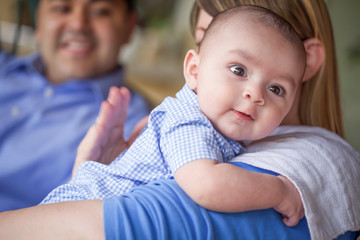Babies are known for their cute and cuddly nature, but they can also be quite fussy at times. One of the common causes of fussiness in babies is trapped gas, which can be quite uncomfortable for them. Burping is one of the ways to help release trapped gas, but you may be curious – “Why won’t my baby burp?”.
There are several reasons why a baby may not burp, including the fact that they haven’t swallowed as much air yet, or they have released any extra air by passing gas instead. However, if your baby is uncomfortable and fussy, it’s important to try and help them burp. This article will provide some tips and tricks to help your baby burp, so they can feel more comfortable and happier.
- Understanding the Importance of Burping
- Common Reasons Why Babies Don't Burp
- Feeding Techniques and Their Impact on Burping
- Different Burping Positions and Methods
- Dealing with a Fussy or Sleepy Baby
- When to Consult a Pediatrician
- Helpful Tips and Tricks for Burping a Baby
- Conclusion
- Frequently Asked Questions
Understanding the Importance of Burping

Burping is a crucial aspect of feeding a baby. It helps to release the trapped air in the baby’s stomach, which can cause discomfort and pain. Burping also helps to prevent the baby’s chin from spitting up and reduces the risk of colic.
When a baby eats, he or she frequently swallows air in addition to the breastmilk or formula. This trapped air can cause discomfort, bloating, and even pain. Burping the baby helps to release this trapped air and make the baby feel more comfortable.
Burping a baby is especially important during the first few months of life when the baby’s digestive system is still developing. During this time, babies tend to swallow more air while feeding, making them more prone to trapped gas.
Parents should look out for signs of trapped gas, such body movements such as fussiness, squirming, and arching of the back. These signs indicate that the the baby’s body is uncomfortable and needs to be burped.
There are several techniques that parents can use to burp their baby, breastfeeding positions such as patting or rubbing the baby’s back baby patting it, or holding the baby in an upright position. It is essential to find the technique that works best for the baby and to burp the baby after every feeding.
In conclusion, burping is an essential aspect of feeding a baby. It helps to release trapped air, reduce discomfort, and prevent colic. Parents should learn the signs of trapped gas and different techniques to burp their baby to ensure that their baby is comfortable and happy after every feeding.
Common Reasons Why Babies Don’t Burp

Babies are known to be gassy creatures, and burping is one way to relieve them of any trapped gas in their stomach. However, some babies may not burp as easily as others, and this can cause concern for parents. Here are some common reasons why babies don’t burp:
1. Sleeping
A sleeping baby is a baby who doesn’t burp easily. For a variety of reasons, babies frequently nod off while being fed. The sucking reflex is very calming in the beginning. They benefit from feeling safe and at ease. This can also help them nod off. When a baby falls asleep while feeding, it can be challenging to get them to burp.
2. Overfeeding
Overfeeding can also cause a baby not to burp. When a baby is overfed, they may swallow a lot of air, which can cause discomfort and trapped gas. This can make it difficult for them to burp. It is essential to watch for signs of fullness and to feed the baby in smaller, more frequent meals.
3. Reflux
Reflux is a common condition in babies that can cause them to spit up or have difficulty burping. Stomach acid can run back up into the esophagus when the muscle at the bottom of the esophagus fails to seal completely. This can cause discomfort and make it challenging for the baby to burp.
4. Trapped Gas
Trapped gas is a common cause of fussiness and discomfort in babies. When gas bubbles when a baby swallows air during feeding, it can become trapped in their stomach, causing discomfort. This trapped gas can make it challenging for the baby to burp.
5. Colic Symptoms
Colic is a term used to describe excessive crying and fussiness in babies. It is often a sign that the baby is experiencing discomfort or pain. Colic symptoms can make it difficult for the baby to burp, as they may be too fussy or uncomfortable to sit still and burp.
In conclusion, there are several common reasons why babies may not burp easily. It is essential to be patient and try different techniques to help the baby burp, such as changing positions, rubbing or patting their back, or taking a break and trying again later. If the baby continues to have difficulty burping, it is best to consult a pediatrician for further evaluation.
Feeding Techniques and Their Impact on Burping

The feeding technique used can have an impact on the amount of air a baby swallows, and consequently, on the frequency and ease of burping. Breastfed babies may swallow less air than bottle-fed babies, as they can control the flow of milk and the amount swallowed air they take in, and the nipple shape is designed to make milk flow and mimic the mother’s breast. However, some breastfed babies may still swallow air if they have a shallow latch or if the mother has an overactive letdown.
Bottle-fed babies, on the other hand, may swallow more air as the flow of milk is not under their control, and the nipple shape may not be ideal for their mouth. Choosing the right type of bottle and formula can help reduce the amount of air a bottle feeding a baby swallows. Anti-colic bottles, for example, are designed to reduce the amount of air that enters the baby’s stomach, while thickened formulas may help reduce reflux and spit-up.
The feeding routine can also affect how much air a baby swallows. Feeding in a calm and quiet environment can help reduce distractions and allow the baby to focus on feeding, while feeding too quickly or forcefully can cause the baby to swallow more air. It is important to take breaks during feeding to burp the baby and allow them to rest.
Parents can try different feeding techniques to help reduce the amount of air their baby swallows. For example, holding the baby in an upright position during feeding can help prevent breast milk out from flowing out too much motion quickly and reduce the risk of air swallowing. Frequently burping the infant during feedings might also aid in releasing trapped air and avert discomfort.
Overall, the feeding technique used and the feeding routine can have an impact on the frequency luck burping and ease of burping babies do. Parents can try different techniques and experiment with different bottles and formulas to find what works best for their baby.
Different Burping Positions and Methods

Burping a baby can be a challenging task, especially if the baby is not cooperating. However, trying different burping positions and methods can help to ease the process. Here are some of the most common burping exercises, positions and methods that parents can try:
Over the Shoulder
The over the shoulder position is one of the most common burping positions. In this position, the parent holds the baby upright with flat palm and the baby’s head resting on their shoulder. The parent then gently pats the baby’s back with their other hand. This is most common burping position that can be used after feeding the baby.
Sitting Upright
The sitting upright position is another effective way to burp a baby. In this position, the parent holds the baby in a sitting position with the baby’s back against their chest. The parent then gently pats the baby’s back. This position can be used after feeding the baby.
Sitting on Your Lap
The sitting on your lap position is another popular burping position. In this position, the parent sits the baby on their lap facing away from them. The parent then supports the baby’s chest and chin with one hand and gently pats the baby’s back with the other hand. This is common burping position that can be used after feeding the baby.
Semi-Upright Position
The semi-upright position is another effective way to burp a baby. In this position, the parent holds the baby in a semi-upright position with the baby’s back against their chest. The parent then gently pats the baby’s back. This position can be used after feeding the baby.
Bicycle Legs
The bicycle legs method is another way to help a baby burp. In this method, the parent lays the baby on their back and gently moves their legs in a cycling motion. This motion can help to release any trapped gas.
On Your Chest
The on your baby’s tummy chest position is another way to help a baby burp. In this position, the parent lays the baby on their chest with the baby’s head turned to the side. The parent then gently pats the baby’s back. This position can be used after feeding the baby.
Football Hold
The football hold is another effective way to burp a baby. In this position, the parent holds the baby’s legs up under their arm like a football, with the baby’s head supported by their hand. The parent then gently pats the baby’s back. This position can be used after feeding the baby.
Trying different burping positions and methods can help to relieve any discomfort caused by trapped gas in babies. Parents should experiment with different positions and methods to find the most effective one for their baby.
Dealing with a Fussy or Sleepy Baby

Babies can be fussy or sleepy, making it challenging to burp them. Here are some tips to help deal with a fussy or sleepy baby:
- Hold the baby in an upright position: Holding the baby in an upright position can help move the air bubbles to the top of the stomach, making it easier to burp. A common position is to hold the baby over your shoulder while supporting their head and neck.
- Gently rub or pat their back: Using the hand that is on their back, make circular motions or gently pat their back to help release the air bubbles. Be sure to avoid using too much pressure, as this can make the baby uncomfortable.
- Consider a change in position: If the baby is fussy or uncomfortable in one position, try changing their position. For example, if the baby is lying down, try holding them in an upright position or sitting them up.
- Stay calm and patient: Fussiness and sleepiness can be stressful for both the baby and the caregiver. It is essential to stay calm and patient when trying to burp a fussy or sleepy baby.
- Recognize and address common causes: Fussiness and sleepiness can be caused by hunger, a dirty diaper, or overstimulation. Addressing these common causes can help soothe a fussy or sleepy baby and make it easier to burp them.
Remember, every baby is different, and what works for one may not work for another. It is essential to be patient and try different techniques until you find what works best for your baby.
When to Consult a Pediatrician

If a baby is consistently having trouble burping, it may be time to consult a pediatrician. In some cases, the issue may be related to a more serious underlying condition.
One such condition is reflux, which occurs when stomach acid flows back up into the esophagus. This can cause discomfort and pain for a baby, and may lead to vomiting or colic symptoms. A pediatrician can help diagnose reflux and provide treatment options to alleviate symptoms.
If a baby is experiencing frequent vomiting or difficulty gaining weight, it is especially important to seek medical attention. These symptoms may indicate a more serious condition, such as pyloric stenosis, which requires prompt medical intervention.
In addition to these more serious conditions, a pediatrician can also provide guidance on burping techniques and positions that may be more effective for a particular baby. They can also help rule out any potential food allergies or sensitivities that may be contributing to the problem.
Overall, if a baby is consistently having trouble burping or experiencing other symptoms, it is important to consult a pediatrician for proper diagnosis and treatment.
Helpful Tips and Tricks for Burping a Baby

Burping a baby can sometimes be a tricky and frustrating task, especially when the baby won’t burp. Here are some helpful tips and tricks to try and burp your baby:
- Change positions: Sometimes, changing the position of the baby can help release trapped air. Try holding the baby upright with their chin resting on your shoulder or laying them across your lap with their belly facing down.
- Massage the baby’s back: Gently massaging the baby’s back can help release trapped air. Use circular motions and apply slight pressure.
- Use gas drops or gripe water: Gas drops and gripe water are over-the-counter medications that can help relieve gas and discomfort in babies. However, it’s important to consult with a doctor before giving any medication to a baby.
- Try different burping methods: There are several burping methods to try, such as patting the baby’s back, rubbing the baby’s back, or gently bouncing the baby.
- Establish a routine: Establishing a routine for burping can help prevent excess air from getting trapped in the baby’s stomach. Try burping the baby after every feeding or halfway through a feeding.
- Consult a lactation consultant: If the baby is struggling with gas and discomfort, it may be helpful to consult a lactation consultant. They can provide guidance on proper feeding techniques and help identify any underlying issues.
- Ensure a good latch: A good latch can help prevent the baby from swallowing excess air during feedings. Make sure the baby’s mouth is properly latched onto the breast or bottle.
- Encourage passing gas: Encouraging the baby to pass gas can help release trapped air. Try laying the baby on their back and gently moving their legs in a bicycling motion.
It’s important to remember that every baby is different and what works for one may not work for another. Additionally, excessive gas and discomfort may be a sign of an underlying issue and it’s important to consult with a doctor if the problem persists.
Conclusion

In conclusion, there could be several reasons why a baby won’t burp. It could be due to efficient feeding, prevent excess gas to release through passing gas, or other factors. Parents should not worry too much if their baby does not burp after every feeding session, as excess gas will eventually makes its way out of the GI system.
However, if a baby seems uncomfortable, cries excessively, or shows signs of colic, parents should try different burping techniques to help relieve gas. Some effective methods include holding the baby upright, gently patting or rubbing their back, or using a specialized burping position.
It is essential for new parents to to be patient and persistent when trying to burp their baby. It may take several attempts before the baby releases gas, and it is crucial to avoid overstimulating or upsetting the baby during the process.
Overall, parents should trust their instincts and seek medical advice if they have concerns about their baby’s feeding or digestive issues. With proper care and attention, most babies will eventually learn to burp on their own, healthy infants and parents can enjoy a more comfortable and happy feeding experience.
Frequently Asked Questions
How to burp a newborn that won’t burp
Burping a newborn can be a challenge, especially if they won’t burp. Some tips to try include changing positions, such as holding the baby upright or over your shoulder, and gently burping session while patting or rubbing their back. You can also try massaging their tummy or doing bicycle legs to help release any trapped gas.
Baby won’t burp after 30 minutes
It’s not uncommon for a baby to take longer than 30 minutes to burp, especially if they are a slow feeder. However, if your baby hasn’t burped after 30 minutes, it’s okay to stop trying to burp baby and resume feeding. You can always try to burp them again a few minutes later.
Baby won’t burp and gets hiccups
Hiccups can be a sign that your baby has swallowed too much air, but they don’t necessarily mean that your baby needs to burp. If your baby gets hiccups after feeding, you can try to burp them to see if it helps, but it’s not always necessary.
When to stop burping a baby
It’s generally recommended to continue burping a baby until they are around 6 months old or until they can sit up on their own. However, if your baby seems comfortable and doesn’t seem to need to burp after a few other ways, it’s okay to stop trying.
Baby won’t burp but spits up
Spitting up is common in babies, and it doesn’t necessarily mean that your baby needs to burp. However, if your baby is spitting up frequently or seems uncomfortable, it’s a good idea to try to burp them after feeding to see if it helps.
What to do when your baby won’t burp?
If your baby won’t burp, there are several things you can try, such as changing positions, massaging their tummy, or doing bicycle legs. It’s also important to make sure that your baby is latching correctly and not swallowing too much air during feeding. If you’re concerned, it’s always a good idea to consult with your pediatrician.





Nice info. Thanks for your information